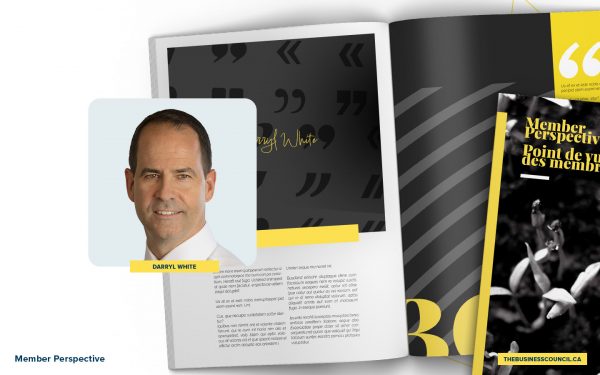March 2024 newsletter
For the latest research, analysis and perspective on business and policy in Canada, sign up for our newsletter today.
Dear friends,
On Saturday we said goodbye to Canada’s 18th Prime Minister – the Right Honourable Brian Mulroney.
I’m struggling to imagine where we would be today if it hadn’t been for his courageous leadership on consequential issues such as free trade, tax reform and the environment. It is in no way an exaggeration to say that Brian Mulroney created much of the foundation on which our country’s modern prosperity rests.
I was honoured to have known him, and as I reflect on his legacy, here are just a few things I learned from him:
- As a country, we can succeed when we are bold, take risks and embrace an ambitious vision for our future.
- Our many trade agreements – beginning with the Canada-U.S. Free Trade Agreement – have demonstrated that Canadian companies can compete with the best in the world.
- We are stronger as a country when we put aside our differences and work together towards common goals.
- Leadership is about having the courage to do what’s right for the long term … even if it’s unpopular in the short term.
In the coming weeks we will see a new federal budget that I hope will include similarly daring policies aimed at capitalizing on Canada’s strengths and cultivating economic growth.
Kind regards,

Goldy Hyder
President and CEO
Business Council of Canada
Latest Newsletters

Last week the Coalition for a Better Future, representing a diverse group of Canadian leaders and organizations, released its second scorecard which tracks progress on 21 internationally recognized metrics. The report Fragile Growth – An urgent need to get the basics right demonstrates that we have a lot of work ahead of us if we want to achieve strong, sustainable economic growth in our country.
In an effort to include more Canadians in a national conversation about the importance of economic growth, the Coalition has launched an online portal. I encourage you to use the portal to share your ideas, feedback and stories about the role economic growth plays in all of our lives. As the Coalition says, economic growth is “the driving force that ensures we can put food on our tables, go to work, take care of our children, seniors and those most vulnerable, and ensure the air we breathe is clean.”

In the 2023 Fall Economic Statement, the federal government announced a series of new commitments to cap the size of future deficits, including a pledge to keep deficits below one per cent of GDP in 2026-27 and beyond. However, as BCC Senior VP of Policy Robert Asselin demonstrates in his latest report, the government’s track record speaks for itself: since 2020, the federal government has never met a fiscal target it imposed on itself.
As Finance Minister Freeland prepares for the April 16th budget, we are reminded that fiscal anchors are not just words on paper. They are important markers for international markets and Canadian citizens alike to know that public finances are sustainable over the long run.

Last month, the BCC’s Michael Gullo, Vice President, Policy, spelled out our ongoing concerns about the federal government’s proposed framework for capping oil and gas emissions. At a time of weak economic growth and severe strains on public finances, reducing the overall capacity of Canada’s most productive sector would result in a shockwave throughout the economy and beyond.
Instead of this ill-advised regulation, Michael urges the government to focus on providing policy certainty and the incentives necessary to accelerate investment. Without these elements, Canada will struggle to attract the capital it needs to compete in a low-carbon economy.
In December we asked you if you thought 2024 would be better, worse or the same as 2023. Here’s what you told us:












